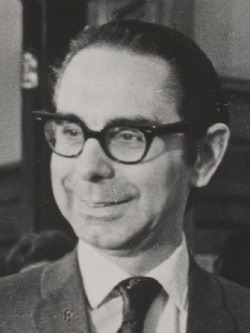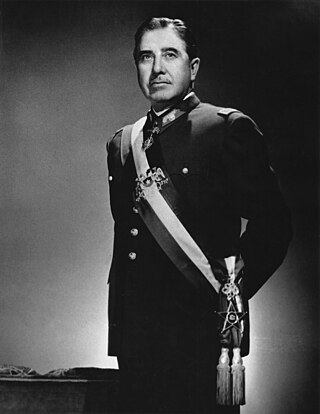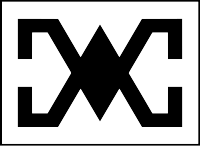
The territory of Chile has been populated since at least 3000 BC. By the 16th century, Spanish conquistadors began to colonize the region of present-day Chile, and the territory was a colony between 1540 and 1818, when it gained independence from Spain. The country's economic development was successively marked by the export of first agricultural produce, then saltpeter and later copper. The wealth of raw materials led to an economic upturn, but also led to dependency, and even wars with neighboring states. Chile was governed during most of its first 150 years of independence by different forms of restricted government, where the electorate was carefully vetted and controlled by an elite.

Juan Manuel "Mamo" GuillermoContreras Sepúlveda was a Chilean Army officer and the former head of the National Intelligence Directorate (DINA), Chile's secret police during the dictatorship of General Augusto Pinochet. In 1995, he was convicted of the murder of Chilean diplomat Orlando Letelier in Washington, DC, and sentenced to seven years in prison, which he served until 2001. At the time of his death, Contreras was serving 59 unappealable sentences totaling 529 years in prison for kidnapping, forced disappearance, and assassination.

The Christian Democratic Party is a Christian democratic political party in Chile. There have been three Christian Democrat presidents in the past, Eduardo Frei Ruiz-Tagle, Patricio Aylwin, and Eduardo Frei Montalva.

The 1973 Chilean coup d'état was a military overthrow of the Popular Unity government in Chile, led by the democratic socialist Salvador Allende as president of Chile. Allende, who has been described as the first Marxist to be democratically elected president in a Latin American liberal democracy, faced significant social unrest, political tension with the opposition-controlled National Congress of Chile, and economic warfare ordered by United States president Richard Nixon. On September 11, 1973, a group of military officers, led by General Augusto Pinochet, seized power in a coup, ending civilian rule. In 2000, the CIA admitted its role in the 1970 kidnapping of a top general who had refused to use the army to stop Allende's inauguration. 2023 declassified documents showed that Nixon, Henry Kissinger, and the United States government, which had branded Allende as a dangerous communist, were aware of the coup and its plans to overthrow Allende's democratically-elected government.

Inti-Illimani are an instrumental and vocal Latin American folk music ensemble from Chile. The band was formed in 1967 by a group of university students and it acquired widespread popularity in Chile for their song Venceremos, which became the anthem of the Popular Unity government of Salvador Allende. When the 1973 Chilean coup d'état took place, they were on tour in Europe and were unable to return to their country where their music was proscribed by the ruling military junta of Augusto Pinochet. In Europe their music took on a multifarious character, incorporating elements of European baroque and other traditional music forms to their Latin American rhythms, creating a fusion of modern world music. Their name means 'Sun of the Golden Eagle' in Aymara.

An authoritarian military dictatorship ruled Chile for seventeen years, between 11 September 1973 and 11 March 1990. The dictatorship was established after the democratically elected socialist government of Salvador Allende was overthrown in a coup d'état backed by the United States on 11 September 1973. During this time, the country was ruled by a military junta headed by General Augusto Pinochet. The military used the breakdown of democracy and the economic crisis that took place during Allende's presidency to justify its seizure of power. The dictatorship presented its mission as a "national reconstruction". The coup was the result of multiple forces, including pressure from conservative groups, certain political parties, union strikes and other domestic unrest, as well as international factors.

Salvador Allende was the president of Chile from 1970 until his suicide in 1973, and head of the Popular Unity government; he was a Socialist and Marxist elected to the national presidency of a liberal democracy in Latin America. In August 1973 the Chilean Senate declared the Allende administration to be "unlawful," Allende's presidency was ended by a military coup before the end of his term. During Allende's three years, Chile gradually transitioned into a socialist state.

The Revolutionary Left Movement is a Chilean far-left Marxist-Leninist communist party and former urban guerrilla organization founded on 12 October 1965. At its height in 1973, the MIR numbered about 10,000 members and associates. The group emerged from various student organizations, mainly from University of Concepción, that had originally been active in the youth organization of the Socialist Party. They established a base of support among the trade unions and shantytowns of Concepción, Santiago, and other cities. Andrés Pascal Allende, a nephew of Salvador Allende, president of Chile from 1970 to 1973, was one of its early leaders. Miguel Enríquez was the General Secretary of the party from 1967 until his assassination in 1974 by the DINA.

Inés Lucía Pinochet Hiriart is the eldest daughter of former Chile's President Augusto Pinochet and Lucía Hiriart de Pinochet. She was a councilor for the municipality of Vitacura, from 2008 until 2012.

El Tanquetazo or El Tancazo was an attempted coup d'état that occurred in Chile on 29 June 1973.
The Argentine Anticommunist Alliance was an Argentine Peronist and fascist political terrorist group operated by a sector of the Federal Police and the Argentine Armed Forces, linked with the anticommunist lodge Propaganda Due, that killed artists, priests, intellectuals, leftist politicians, students, historians and union members, as well as issuing threats and carrying out extrajudicial killings and forced disappearances during the presidencies of Juan Perón and Isabel Perón between 1973 and 1976. The group was responsible for the disappearance and death of between 700 and 1100 people.
Michael Vernon Townley is an American-born former agent of the Dirección de Inteligencia Nacional (DINA), the secret police of Chile during the regime of Augusto Pinochet. In 1978, Townley pled guilty to the 1976 murders of Orlando Letelier, former Chilean ambassador to the United States, and Ronni Karpen Moffitt, Letelier's co-worker at the Institute for Policy Studies. He was sentenced to ten years in prison, serving 62 months. As part of his plea bargain, Townley received immunity from further prosecution; he was not extradited to Argentina to stand trial for the 1974 assassination of Chilean General Carlos Prats and his wife in Buenos Aires.

Carlos Altamirano Orrego was a Chilean lawyer and socialist politician.

The Government Junta of Chile was the military junta established to rule Chile during the military dictatorship that followed the overthrow of President Salvador Allende in the 1973 Chilean coup d'état. The Government Junta was the executive and legislative branch of government until December 17, 1974, when Augusto Pinochet rose was formally declared President of Chile in late 1974. After that date, it functioned strictly as a legislative body until the return to democracy in 1990.

Augusto José Ramón Pinochet Ugarte was a Chilean general and dictator who ruled Chile from 1973 to 1990, first as the leader of the Military Junta of Chile from 1973 to 1981, being declared President of the Republic by the junta in 1974 and becoming the de facto dictator of Chile, and from 1981 to 1990 as de jure president after a new constitution, which confirmed him in the office, was approved by a referendum in 1980. His rule remains the longest of any Chilean leader in history.
Following the 1973 Chilean coup d'état, an armed leftist resistance movement against Augusto Pinochet's dictatorship developed until 1990 when democracy was restored. This conflict was part of the South American theater in the Cold War, with the United States backing the Chilean military and the Soviet Union backing the guerrillas. The main armed resistance groups of the period were the Revolutionary Left Movement (MIR) and Frente Patriótico Manuel Rodríguez (FPMR), the armed wing of the Communist Party. These groups had a long-standing rivalry, including over Marxist orthodoxy and its implementation.
Events in the year 1973 in Chile.
Pablo Rodríguez Grez is a Chilean politician and lawyer. He supported and was a former lawyer for Pinochet. He became known for his fascist ideals and for founding the Fatherland and Liberty movement, in which he had been accused of terrorist acts, in addition to collaborating with Pinochet's coup in 1973. He was also a candidate for the National Advance party for the presidency of Chile in 1989. He has been a teacher of Civil Law at the Faculty of Law of the University of Chile since 1978 and is a partner at the law firm Rodríguez Vergara y Compañía.

Walter Robert Thieme Schiersand is a Chilean furniture maker, painter, and politician. He gained notoriety by becoming one of the highest leaders of the Fatherland and Liberty Nationalist Front, an organization strongly opposed to the government of Salvador Allende through violent means, often resorting to worker riots. After the 1973 Chilean coup d'état and installment of the subsequent military junta, he went through a major ideological change, after which he became a political activist, often organizing events against the regime led by Augusto Pinochet, which he accused of abandoning nationalism in favor of global neoliberalism. Currently, he defines himself as a nationalist, anti-capitalist, anti-imperialist, and Indigenista.














